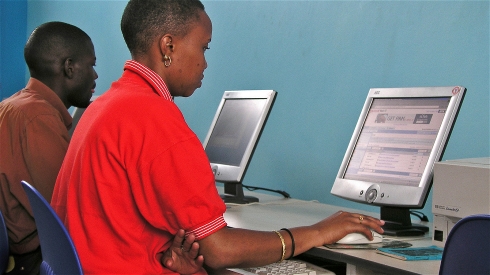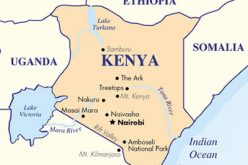JOHANNESBURG/NAIROBI, (IRIN) – Although Africa’s economy has expanded rapidly in recent years, it has not kept pace with the growth of its youth population or their need for jobs.
With almost 200 million people between 15 and 24 years old – a figure that is set to double by 2045, according to the African Economic Outlook’s (AEO) 2012 report – the continent has the youngest population in the world. Yet despite the increasing percentage of Africa’s young people with secondary and tertiary educations, many find themselves unemployed or underemployed in the informal economy. Part of the problem, according to the AEO study, is a mismatch between the skills young jobs seekers have to offer and those that employers need.
The world’s increasingly digitalized economy needs workers with the skills to capture and manage the vast amounts of data it generates. With appropriate training, such tasks can be performed anywhere in the world. Data generated by a high-tech company in Silicon Valley, for example, can be processed by youth with smartphones or tablets living in a slum in Nairobi, Kenya. This means that digital work could potentially alleviate the unemployment and poverty hampering development in many African countries.
Both the private and humanitarian sectors are starting to recognize this potential and find ways to harness it.
Skills for the future
The Rockefeller Foundation recently launched Digital Jobs Africa, a seven-year, US$83 million initiative to improve the lives of one million people in six African countries through digital job opportunities and skills training.
Eme Essien Lore, the foundation’s Nairobi-based senior associate director, explained that having identified youth unemployment as one of Africa’s most pressing problems, the organization was looking for ways to help young people on the continent gain sustainable, long-term job opportunities.
“The reason digital employment really rose to the top for us was because we saw the skills they get from these kinds of jobs as a springboard to other types of employment,” she told IRIN. “We know young people take time to figure out what they want to do. Also, we don’t know what the future labour market is going to look like. So we thought this was a very important sector because it develops skills they can use whether they stay in the digital economy or move into other sectors.”
The six focus countries – Egypt, Ghana, Kenya, Nigeria, Morocco and South Africa – share particularly high youth unemployment rates and have rapidly developing information and communications technology (ICT) infrastructures. Some, such as Nigeria and South Africa, have booming ICT sectors in need of labour, while others, such as Morocco, are well-placed to meet demand from Europe and the US, said Lore.
Winnie Mwihaki, 24, is among 500 Kenyan youths from poor backgrounds recruited by one of the Rockefeller Foundation’s grantees – San Francisco-based non-profit Samasource. Globally, the company has connected an estimated 3,700 young people in nine countries to paying work and hopes to expand this number to 5,000 by the end of 2013.
Samasource secures data- and content-processing jobs from its US-based clients, and then uses its specially developed software to break these large digital projects down into small computer-based tasks it calls “microwork”. This work is then distributed to local partners that are responsible for recruiting, training and managing employees.
Unlike most companies in the business process outsourcing (BPO) and information technology outsourcing industry, Samasource only employs people living below the poverty line. Workers must also be between 18 and 30 years old, and preference is given to women, who are less likely to have access to formal employment.
“We can bring someone in with virtually no experience, and in a matter of weeks they can start doing small tasks on a computer”
“Part of the criteria is that people need to be literate in English,” added Lauren Schulte, director of marketing and communications at Samasource. “They don’t have to have any computer skills. We can bring someone in with virtually no experience, and in a matter of weeks they can start doing small tasks on a computer.”
With her monthly salary of 13,000 shillings [$149], Mwihaki is able to assist her mother, who had been struggling to care for their family of six. “Because of the money I earn from here, I am now able to help my mother [and] to also be a breadwinner in the family,” Mwihaki told IRIN.
Mwihaki grew up in Korogocho, a sprawling slum in Nairobi, where crime is commonplace. She was unable to proceed to college after secondary school because her parents could not afford it.
“Now I will use part of what I earn from this job to sponsor myself through college,” she said.
A new trajectory
Samasource is not the only company targeting disadvantaged people in low-income areas with digital employment. Another Rockefeller Foundation grantee, Digital Divide Data, operates on a similar principle and employs more than 1,000 people in Cambodia, Kenya and Laos. Both companies are considered pioneers of impact sourcing, which the Rockefeller Foundation defines as “the socially responsible arm of the BPO and information technology outsourcing industry”.
A relative newcomer to the sector, and another Rockefeller Foundation grantee, is the Impact Sourcing Academy (ISA) in Johannesburg, South Africa. ISA combines a training and job placement programme with a fully functional call centre that gives its students the opportunity to obtain practical work experience while earning enough money to help support their families.
“We’re not so much interested in just giving them a job as a call centre agent,” said ISA head Taddy Blecher. “We really want to make sure they’re doing part-time studies while they’re working, getting access to more knowledge and training so they can move into higher-level jobs.”
Once graduates are fully employed and earning a decent salary, they are encouraged to fund another student from a similar background. Using this model, the academy is already about 65 percent self-funded and aims to be completely self-funded in the future.
Blecher described the Rockefeller Foundation initiative as “a massive opportunity” for South Africa, given the need for skilled labour to work in its booming BPO sector and its 51 percent youth unemployment rate. “In a short period of time, you can bring a family out of poverty and put them on a whole new trajectory,” he told IRIN.
Opening doors
For now, evidence that impact sourcing really can lift families out of poverty is limited to the small studies the Rockefeller Foundation has conducted with Samasource and Digital Divide Data. “What we want to do next is really measure the impacts on a household level,” said Lore. “Anecdotally, we’re quite convinced, but we need to work on measuring over the next seven years.”
The Rockefeller Foundation does not stipulate a minimum wage that its grantees must pay, and the line between a living wage and an exploitatively low wage can be a fine one. “This is a sector where companies’ first priority is really around cost savings,” acknowledged Lore. “If you take the example of someone living in a slum, [a job like this] won’t get them into a nicer neighbourhood. But it might be able to buy food for the family and get younger siblings into school,” she said.
She added that the demand for young people with these skills is such that they are often poached by rival companies offering slightly higher salaries. “We’ve seen that when people move from these jobs, usually after about two years, they go on to better jobs. You rarely see people sitting in these types of jobs indefinitely.”











